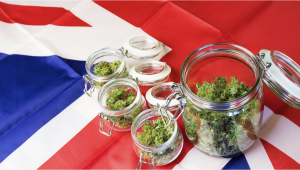UK: A New Study Surveyed Users About the Best Model of Cannabis Regulation

A team of UK scientists set out to generate a model of regulating the future cannabis market in the country. Their aim was not so much to approach the task with healthcare and policing in mind, but to come up with a system that actual cannabis smokers would find acceptable. The idea was that a new regulatory framework should be able to successfully compete with the black market. Or better still, make it a thing of the past.
Participants Recruited via Multidisciplinary Association for Psychedelic Studies
The researchers chose to obtain their results from an inherently biased sample of people who have personal interest in cannabis reform and are informed about psychedelics in general. With this in mind, they advertised through social media and the newsletter of the Multidisciplinary Association for Psychedelic Studies, or MAPS. These channels also allowed them to reach and recruit a substantial number of healthcare professionals.
As a result, the team had a chance to survey 397 individuals from different countries but mostly from the UK and the US. A majority of those had smoked cannabis at least once in their lifetime. Notably, participants’ responses indicated that some of them had concerns about risks associated with the use of the substance and didn’t advocate for its complete deregulation.
Pharmacies and Shisha-Bars as Preferred Vendors of Cannabis
A previous study has shown that a representative sample of the UK population think that cannabis should be sold in pharmacies as opposed to licensed shops or the black market. In 2018, the country rescheduled cannabis to Schedule 2, allowing patients with certain medical conditions to gain access to this medicine. However, people wishing to try a cannabis treatment, still face major hurdles in obtaining it.
The new study found that the participants liked the idea of cannabis being sold in pharmacies. However, they thought that—for harm reduction purposes—the substance should also be provided to patients without a prescription. At the same time, they did not oppose the idea of interviewing and screening such patients for problem use.
A majority of participants also thought that there should be a regulated recreational market existing outside the system of pharmacies. They supported the idea of shisha-type bars, or hookah lounges, where onsite consumption of cannabis would be allowed. Finally, they determined that people should have a right to grow cannabis in their homes and use it either medically or recreationally but not to sell it for profit.
The study was published in the Drug Science, Policy and Law Journal earlier this month.









Comments